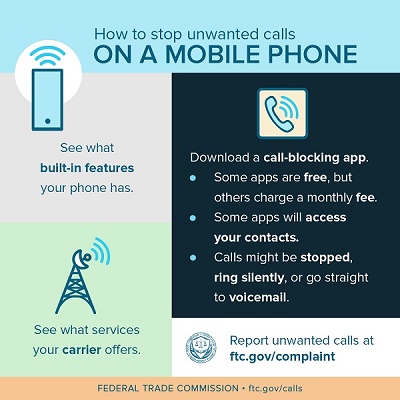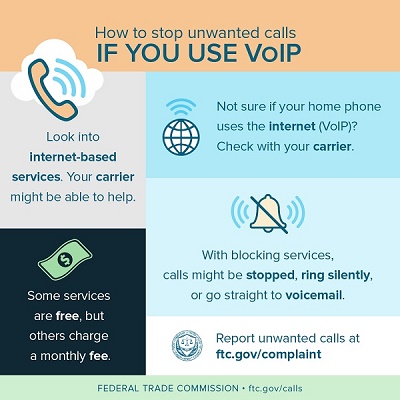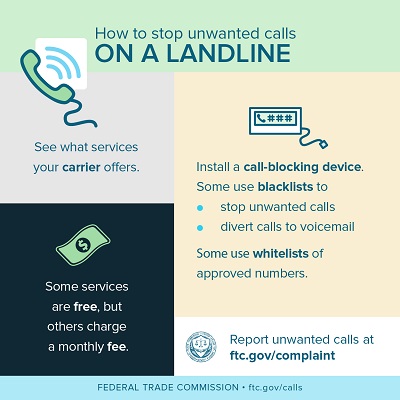There are affiliate links on this page.
Read our disclosure policy to learn more.
You answer your phone and right away, you can tell it is a robocall. But SOME of the calls are not illegal. Under FTC rules, some robocalls don't require your permission:
Which robocalls ARE allowed by law:
- Messages that are purely informational. Robocalls about your flight being cancelled, reminding you about an appointment, or letting you know about a delayed school opening fall into this category, as long as the caller doesn't also try to sell you something.
- Debt collection calls. A business contacting you to collect a debt can use robocalls to reach you. But robocalls that try to sell you services to reduce your debt are illegal and are almost certainly scams. And there are laws about what they can say or do - they are not allowed to harass you or contact your employer. See this page for more about debt collection.
- Political calls. - it seems crazy, but unfortunately the politicians carved out an exemption for themselves. What else would you expect from them?
- Calls from some health care providers. This includes a robocall from a pharmacy reminding you to refill a prescription.
- Messages from charities. Charities can make these calls themselves. But if a charity hires someone to make robocalls on its behalf, the robocalls can only go to members of the charity or prior donors. They also must include an automated option to let you stop future calls. These are often the hardest to stop. They sell their lists to other charities, so once you donate to one, you WILL be bombarded by calls for siumilar charities. DO NOT to ANY charoitiy that contacts you by phone. Donate through your employer at work (they often match, which increases the donation) or do it anonymously or through their website. Never give your phone number to ANY charity, EVER! If they insist, give them a made up number oir a number you no longer use.
How to BLOCK any type of call
Which type of call-blocking or call-labeling technology you use will depend on the phone - whether it's a mobile, traditional landline, or a home phone that makes calls over the internet (VoIP).
- What Is Call Blocking?
- Block Calls on a Mobile Phone
- Block Calls on a Home Phone That Uses the Internet (VoIP)
- Block Calls on a Traditional Landline
- What About the National Do Not Call Registry?
- What About Robocalls?
- Calls from Fake Numbers - or "Spoofing"
- Report Unwanted Calls
What Is Call Blocking?
When we talk about call blocking, we're talking about technologies or devices that can stop a lot of the unwanted calls you get - like scam calls and illegal robocalls - before they reach you. Mobile phones, landlines, and home phones that use the internet (VoIP) each have their own call-blocking options. Just know that call-blocking services could block some legitimate calls.
Some companies also offer call labeling. Call-labeling services show categories like "spam" or "scam likely" on your phone's display for incoming calls. Then you can decide whether to answer the call.
Block Calls on a Mobile Phone
Download a call-blocking app
One of the best ways to block unwanted calls on a mobile phone is to download a call-blocking app. A call-blocking app acts like a filter. The company behind the app uses call data or reports from users to predict which calls are illegal or likely scams. The app then intercepts those calls before they reach you. Some apps are free, but others you have to pay for.
To get a call-blocking app:
- Go to the online app store for your phone's operating system (iOS, Android, etc.) and look at ratings for different apps.
- Look online for expert reviews on call-blocking apps.
- You also can find a list of call-blocking apps for mobile phones at ctia.org, a website for the U.S. wireless communications industry. The site lists apps specific to Android, BlackBerry, iOS (Apple), or Windows devices.
Apps typically let you choose how to respond to calls flagged as scams. Calls might:
- be stopped
- ring silently
- go straight to voicemail
Apps also can let you do things like:
- block calls based on the geographic location or area code of the incoming call
- let you create blacklists of numbers to block, or whitelists of numbers to let through
- send a prewritten text message to the caller
- file a complaint with the FTC (which you also can do at ftc.gov/complaint)
Some apps access your contacts list, so know whether that's important to you. The app's privacy policy should explain how it gets and uses your information.
See what built-in features your phone has
Many cell phones come with menu options that let you block calls from specific numbers, though there might be a limit to how many numbers you can block. Mobile phones also typically have features like Do Not Disturb, where you can set hours during which calls will go straight to voicemail.
See what services your carrier offers
Check your phone carrier's website or call customer service to find out what call-blocking services it offers or recommends. Some services are free, but others might charge you a fee.
For links to company-specific information about blocking calls, go to the FCC's Call Blocking Resources.
Block Calls on a Home Phone That Uses the Internet (VoIP)
First find out if your phone uses the internet (VoIP)
It's possible you have VoIP service on your home phone and don't know it. VoIP stands for Voice over Internet Protocol, and it simply means that your phone makes calls over the internet, not over phone lines. If you're not sure what you have, check with your carrier. But if you get your phone service through a cable company, or use a phone/internet/cable bundle, you probably have VoIP service. If you find out you don't have internet-based phone service, skip down to the advice on blocking calls on a traditional landline.
Read expert reviews on internet-based call-blocking services
Internet-based call-blocking services can block unwanted calls on phones that use the internet. Your carrier might be able to recommend a specific service. But you also can search online for expert reviews. Some services are free and some charge you each month.
Some internet-based services and mobile apps require all calls to be routed through their service, where they are instantly analyzed. You may have choices about how unwanted calls are handled. For example, unwanted calls might:
- be stopped
- ring silently
- go straight to a separate voicemail
- go to a spam folder
See what your carrier offers
Check your carrier's website or call customer service to find out what about options or if there's a service it recommends. Some carriers provide these services for free, but some charge a fee.
For links to company-specific information about blocking calls, go to the FCC's Call Blocking Resources.
Block Calls on a Traditional Landline
Install a call blocking-device
If your home phone is a traditional landline that doesn't use the internet (VoIP), you can buy and install a call-blocking device. Call-blocking devices are typically small boxes you attach to your phone.
Some devices use blacklist databases of known scam numbers but let you add numbers you want blocked. Other devices rely on you to create and update your own blacklist of numbers to block.
Some use blacklists to:
- stop unwanted calls
- divert calls to voicemail
- show a blinking light when an unwanted call comes in
- connect callers to a recording with options so a real caller can still get through
Some devices also use whitelists of approved numbers. That helps you limit which calls get through, or lets you to set up "do not disturb" hours during which calls go straight to voicemail. There are also devices that try to weed out robocalls by playing a prerecorded message prompting callers to press a number to continue the call.
See what services your carrier offers
Some services are free, but some charge a fee.
For links to company-specific information about blocking calls, go to the FCC's Call Blocking Resources.
What About the National Do Not Call Registry?
The National Do Not Call Registry is designed to stop sales calls from real companies that follow the law. The Registry is a list that tells telemarketers what numbers not to call. The FTC does not and cannot block calls. Scammers don't care if you're on the Registry.
Even though the Registry can't stop all of the unwanted calls you're getting, being on the Registry could make it easier for you to spot illegal calls. If a caller is ignoring the Registry, there's a good chance it's a scam. Even if it's not a scam, you don't want to do business with or give your information to someone calling you illegally.
What About Robocalls?
If you answer the phone and hear a recorded message instead of a live person, it's a robocall. Robocalls trying to sell you something are illegal unless you've given the company your written permission to call you that way. If someone is already breaking the law by robocalling you without permission, there's a good chance it's a scam. At the very least, it's a company you don't want to do business with.
Call blocking can help stop robocalls from scammers. But some robocalls might still get through. If you get an illegal robocall, hang up. Don't press a number, which could lead to more robocalls. Then report it to the FTC. Some robocalls are legal and don't require your permission, like purely informational messages, political calls, or calls from charities. But if they try to also sell you something on the call, it becomes an illegal robocall.
Learn more at ftc.gov/robocalls.
Calls from Fake Numbers - or "Spoofing"
Call blocking technology can sometimes stop calls from scammers who can make fake names or numbers show up on your caller ID. Scammers often use these "spoofed" names and numbers in government imposter scams to make you think it's Social Security or law enforcement calling. Then they try to convince you to wire money or pay them with gift cards. Learn more about common phone scams.
In something known as neighbor spoofing, scammers display a number with your area code. They often match the first six digits of your phone number, so you're more likely to answer the call. Often the faked name and number belong to a real person who has no idea their information is being misused.
Report Unwanted Calls
Report unwanted calls at ftc.gov/complaint. Report the number that appears on your caller ID - even if you think it might be spoofed or faked - and any number you're told to call back. The FTC analyzes complaint data and trends to identify illegal callers based on calling patterns. We also use additional information you report, like any names or numbers you're told to call back, to track down scammers.
We take the phone numbers you report and release them to the public each business day. This helps phone carriers and other partners that are working on call-blocking solutions. Your reports also help law enforcement identify the people behind illegal calls.


